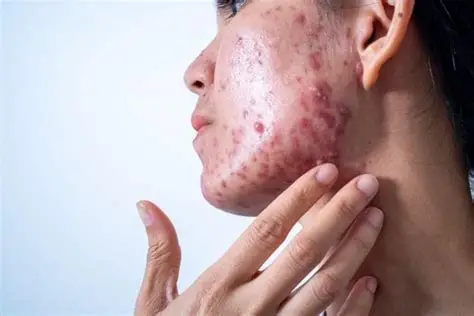When it comes to treating acne, we often hear about well-known ingredients like salicylic acid and benzoyl peroxide. But there’s a powerful, and often overlooked, ingredient that has been used for centuries to fight blemishes: sulfur.
Known for its distinctive “rotten egg” smell, sulfur is a natural mineral that can be a game-changer for those dealing with acne. But does it work on both active spots and old scars? Let’s take a deep dive into the benefits, uses, and limitations of sulfur in your skincare routine.
What Exactly is Sulfur and How Does it Fight Acne?
Sulfur is a natural element that works in a few key ways to combat acne:
- It Dries Out Skin and Absorbs Excess Oil: Sulfur is a keratolytic agent, meaning it helps to shed dead skin cells. This drying action is particularly effective on oily, acne-prone skin. It helps to reduce the amount of oil (sebum) on the surface of your skin, which can prevent new breakouts from forming.
- It Unclogs Pores: By helping to shed dead skin cells, sulfur also works to unclog pores. Clogged pores are the root cause of blackheads and whiteheads, so by keeping your pores clear, sulfur helps to prevent these types of blemishes.
- It Has Antibacterial Properties: Sulfur has a mild antibacterial effect. It helps to inhibit the growth of P. acnes, the bacteria that contributes to inflammatory acne (red, swollen pimples).
Using Sulfur for Active Acne Spots
Sulfur is most effective at treating active acne spots, especially blackheads and whiteheads, and milder forms of inflammatory acne.
- Spot Treatments: Sulfur is a common ingredient in many spot treatments. These products are designed to be applied directly to a pimple to help dry it out and calm inflammation.
- Masks: Sulfur-based face masks are an excellent way to treat oily skin and prevent future breakouts. They can be applied to the entire face (avoiding the eye area) and left on for a set amount of time to help absorb excess oil and purify pores.
- Cleansers: Some cleansers contain sulfur, providing a gentle way to manage oil and prevent breakouts with every wash.
How to Use Sulfur for Acne Spots:
- Start Slow: If you’re new to sulfur, start by using it every other day or a few times a week. This allows your skin to adjust and helps prevent excessive dryness or irritation.
- Apply Thinly: Whether it’s a spot treatment or a mask, a little goes a long way. Apply a thin, even layer to the affected areas.
- Moisturize: Because sulfur can be very drying, it’s crucial to follow up with a gentle, non-comedogenic moisturizer to prevent your skin from over-drying and producing even more oil.
Can Sulfur Help with Acne Scars?
This is where the distinction is important. While sulfur is excellent for treating active acne, it is not an effective treatment for acne scars.
- What are Acne Scars? Acne scars are permanent indentations or marks left on the skin after a severe blemish has healed. They are a result of damage to the collagen and elastin in the skin.
- How to Treat Acne Scars: Treating acne scars requires a different approach. Effective treatments for acne scars include:
- Retinoids: These products help to increase cell turnover and stimulate collagen production, which can improve the appearance of some scars.
- Chemical Peels: A professional chemical peel can help to exfoliate the top layers of skin, revealing a smoother texture underneath.
- Laser Therapy: Laser treatments can help to stimulate collagen production and fill in depressed scars.
- Microneedling: This procedure uses tiny needles to create micro-injuries in the skin, which triggers the body’s healing response and promotes collagen production.
The Verdict: A Targeted Tool, Not a Miracle Cure
Sulfur is a highly effective ingredient for treating and preventing active acne, particularly for oily skin types. It’s a great choice for clearing up blackheads, whiteheads, and mild to moderate inflammatory pimples.
However, it’s crucial to understand its limitations. It will not work on acne scars, and trying to use it for this purpose will only lead to disappointment. For tackling acne scars, it’s best to consult a dermatologist who can recommend professional treatments.
In summary, use sulfur for what it does best: tackling current and future breakouts. For a complete and effective skincare routine, combine a sulfur treatment with other products that address your specific concerns, always remembering to moisturize to keep your skin balanced and healthy.
